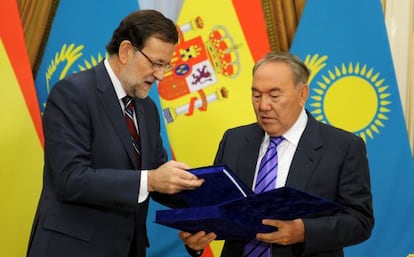Spain’s gulag prisoners brought to light on PM’s Kazakhstan visit
Many of estimated 750 Spanish prisoners in Soviet camps were held in Central Asian country’s “Valley of Hell”

Gifts between national leaders on state visits are nothing out of the ordinary. But the one that Kazakhstan's president, Nursultan Nazarbayev handed Mariano Rajoy last week certainly was: two log books listing Spanish prisoners of the gulags; one a list of those who survived, the other of those who did not.
It is estimated that some 750 Spaniards — 300 Republican fighters stranded in Russia after the Spanish Civil War and 450 members of the Nationalist Blue Division that fought with Germany — were held in the feared Soviet Union prison system. Many of the former were sent to Kok-Usek, known as the "Valley of Hell," in Kazakhstan. They would later be joined by some of the women and children who had been sent to Moscow during Spain's Civil War.
Conditions at the camps were diabolical. Food consisted of two bowls of cabbage soup and 450 grams of bread a day. "They had something called rat water, a delicacy," says Beatriz Leira, the daughter of a Republican sailor.
We hope these documents help Spaniards to find out what happened to their family members"
Those fit enough were sent to the mines, but many were reduced to near starvation. Some who worked the fields would steal a potato, "which tasted as sweet as an apple," says Leira.
Temperatures at Kok-Usek fluctuated between -50ºC in winter and 50ºC in summer. The camp was watched by guards in watchtowers and patrolled by attack dogs. It was mainly for show: if anybody escaped they would perish on the inhospitable steppe.
Nazarbayev's offering represented the first time a former Soviet vassal state has handed over official documentation on Spaniards incarcerated during Stalin's reign of terror. Associations of families of both Republican and Nationalist concentration camp prisoners have written to the government asking for copies of the files.
"We hope that these documents will help Spaniards to find out what happened to their family members who were prisoners," Nazarbayev said. The log books returned to Spain with Rajoy from his subsequent visit to Japan last Friday and the families of those on the lists are now being sought out.







































